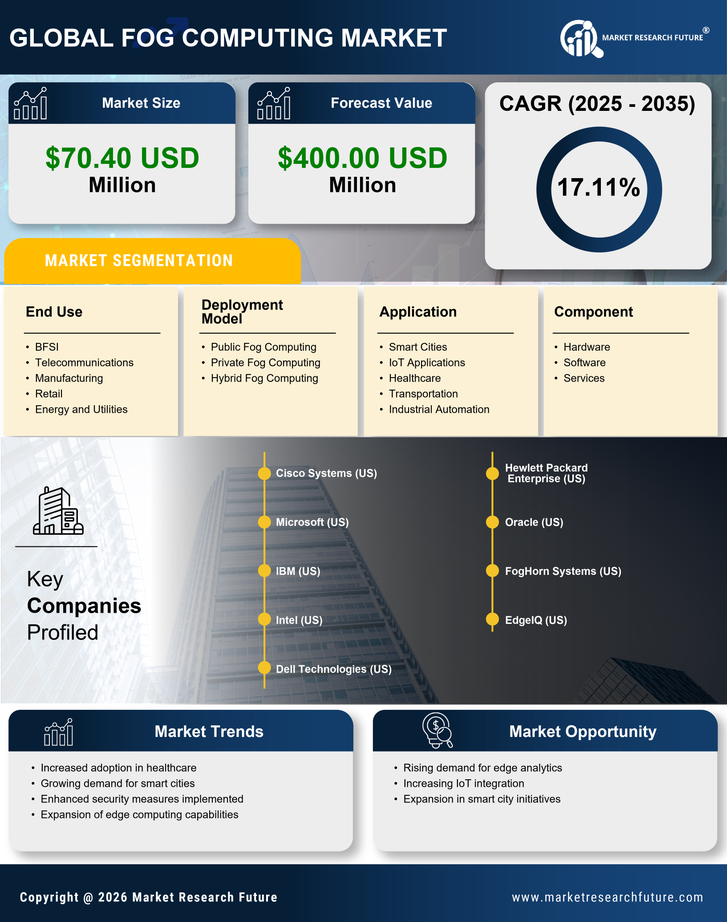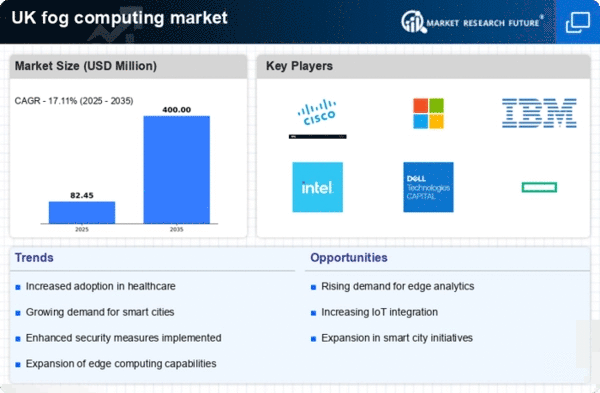Expansion of IoT Applications
The proliferation of Internet of Things (IoT) devices in the UK is significantly influencing the fog computing market. With millions of devices generating vast amounts of data, the need for efficient data management and processing solutions is paramount. Fog computing serves as an intermediary layer, allowing data to be processed locally rather than relying solely on centralized cloud services. This approach not only alleviates bandwidth constraints but also enhances data security and privacy. The fog computing market is expected to benefit from the anticipated growth of IoT, which is projected to reach over 1 billion connected devices in the UK by 2026. This expansion creates a fertile ground for fog computing solutions, as businesses seek to harness the potential of IoT while ensuring seamless data flow and real-time analytics.
Advancements in Network Infrastructure
The ongoing advancements in network infrastructure within the UK are significantly impacting the fog computing market. The rollout of 5G technology is particularly noteworthy, as it promises to enhance connectivity and enable faster data transmission. This improved infrastructure allows fog computing solutions to operate more efficiently, facilitating real-time data processing and analytics. As businesses and municipalities invest in upgrading their networks, the fog computing market is likely to benefit from increased adoption of edge computing solutions. The anticipated growth in 5G subscriptions is expected to reach 25 million by 2025, further driving the demand for fog computing technologies. This trend suggests a robust future for the fog computing market, as organizations seek to leverage enhanced network capabilities to optimize their operations.
Growing Need for Enhanced Data Security
As data breaches and cyber threats become increasingly prevalent, the fog computing market in the UK is witnessing a heightened focus on data security. Fog computing offers a decentralized approach to data management, which can potentially mitigate risks associated with centralized cloud storage. By processing data closer to the source, organizations can implement more robust security measures tailored to specific environments. This shift is particularly relevant for sectors such as finance and healthcare, where data sensitivity is paramount. The fog computing market is likely to see a surge in demand for security-focused solutions, as businesses prioritize safeguarding their data assets. With the UK government emphasizing cybersecurity, the market is expected to grow, with investments in security technologies projected to reach £5 billion by 2026.
Increased Focus on Smart City Initiatives
The UK government is actively promoting smart city initiatives, which are expected to drive the fog computing market forward. These initiatives aim to enhance urban living through the integration of technology in public services, transportation, and infrastructure. Fog computing plays a crucial role in these developments by enabling efficient data processing and communication between devices. As cities become more interconnected, the demand for fog computing solutions that can handle the influx of data from various sources is likely to rise. The fog computing market is poised to capitalize on this trend, with investments in smart city projects projected to exceed £10 billion by 2025. This investment will likely create numerous opportunities for fog computing providers to deliver innovative solutions that support the operational needs of smart cities.
Rising Demand for Real-Time Data Processing
The fog computing market in the UK is experiencing a notable surge in demand for real-time data processing capabilities. As industries increasingly rely on instantaneous data analysis for decision-making, the need for fog computing solutions becomes more pronounced. This technology enables data to be processed closer to the source, reducing latency and enhancing operational efficiency. According to recent estimates, the fog computing market is projected to grow at a CAGR of approximately 30% over the next five years. This growth is driven by sectors such as manufacturing, healthcare, and smart cities, where timely data insights are critical. The fog computing market is thus positioned to play a pivotal role in meeting these evolving demands, facilitating faster responses and improved service delivery across various applications.
















